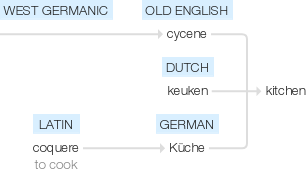Kitchen
Old English cycene, of West Germanic origin; related to Dutch keuken and German Küche, based on Latin coquere ‘to cook’.
wiktionary
From Middle English kychyn, kytchen, kichene, küchen, from Old English cyċen, cyċene, from Proto-West Germanic *kukinā, a borrowing from Vulgar Latin *cocīna, from Latin coquīna(“kitchen; cuisine”), from coquō(“to cook”), from Proto-Indo-European *pekʷ-(“to cook, become ripe”).
In other languages, the cognate term often refers both to the room and the type of cooking. In English, the distinction is generally made via the etymological twins kitchen(“room”) (of Germanic origin) and cuisine(“type of cooking”) (from French).
etymonline
kitchen (n.)
"room in which food is cooked, part of a building fitted out for cooking," c. 1200, from Old English cycene "kitchen," from Proto-Germanic *kokina (source also of Middle Dutch cökene, Old High German chuhhina, German Küche, Danish kjøkken), probably borrowed from Vulgar Latin *cocina (source also of French cuisine, Spanish cocina), a variant of Latin coquina "kitchen," from fem. of coquinus "of cooks," from coquus "cook," from coquere "to cook" (from PIE root *pekw- "to cook, ripen").
The Old English word might be directly from Vulgar Latin. Kitchen cabinet "informal but powerful set of advisers" is American English slang, 1832, originally in reference to President Andrew Jackson, whose intimate friends were supposed to have more influence with him than his official advisers. Kitchen midden (1863) in archaeology translates Danish kjøkken mødding. Surname Kitchener ("one employed in or supervising a (monastic) kitchen") is from early 14c.
